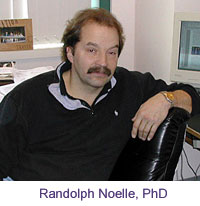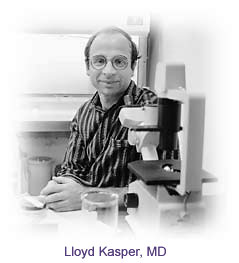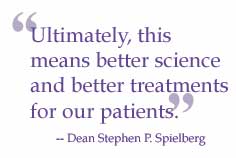|
|
For Release: February 10, 2005
Contact: DMS Communications (603) 650-1492
Dartmouth Medical School Announces Center for Immunotherapy:
Program Will Further Translational Studies and Therapies in Immunology
HANOVER/LEBANON, NH -- A new program to coordinate immunology research across a range of diseases and disciplines was announced today by Stephen P. Spielberg, Dean of Dartmouth Medical School. The Center for Immunotherapy will bring together scientists, clinicians, and researchers from a spectrum of disciplines to study the underlying mechanisms of disease, while producing novel treatments for patients at Dartmouth-Hitchcock Medical Center.
The Center will be directed by Randolph Noelle, PhD, with Lloyd Kasper, MD, serving as co-director. In addition, there will be senior level clinical scientists named to coordinate basic science and clinical studies in the areas of autoimmunity, cancer immunotherapy and infectious disease and biodefense. Support for the creation of this Center comes from the Medical School, the Department of Microbiology and Immunology, the Norris Cotton Cancer Center, the Immunology Center of Biomedical Research Excellence (COBRE) and the Immunology Program at DMS.

"This is an excellent example of the collaboration and integration that allows us to be at the forefront of transforming medical research and the practice of medicine," Spielberg said in making the announcement. "By providing a center for coordinating the vast array of immunology research that is going on here, we not only give structure and support to our talented physicians, basic scientists, and scientists, but we stimulate and speed the process of discovery. Ultimately, this means better science and better treatments for our patients."
Immunology is the study of the body's natural defense mechanisms against disease. Over the last decade, a new class of immunotherapy drugs has been developed, revolutionizing treatments of diseases ranging from cancer to inflammatory bowel disease by enhancing or inhibiting natural immune responses to achieve therapeutic results. Research into even more novel therapies is continuing at a rapid rate.

Currently at DMS and DHMC, clinicians and researchers in the fields of cancer, neurology, infectious disease, gastroenterology and other disciplines are pursuing clinical trials using various immunotherapeutics. The new center will provide a coordinating mechanism with a common lab and common clinical trial base that will allow physicians and researchers from different disciplines to interact around some of the same challenges and possible therapeutic solutions. Not only will this allow for greater interaction across disciplines, it is expected to help streamline, simplify and accelerate the process by which therapies move from the lab to the patient bedside.
Norris Cotton Cancer Center Director Mark Israel, MD, noted that this is exactly the kind of translational research that the National Institutes for Health (NIH) has made the foundation of its "Roadmap" initiative to speed medical discovery. "Increasingly, we recognize that to succeed against cancer and many other diseases, we must shift our focus from treating a specific disease to working with the molecular and cellular processes that underlie those diseases " Israel said. "The Center for Immunotherapy will provide the multidisciplinary focus and streamlined pathways to discovery that we need to make critical discoveries and develop new therapies more quickly."
The center will have three main programmatic areas: cancer; autoimmunity; and infectious disease/biodefense. Clinical directors will focus on developing multidisciplinary clinical trials and program projects for potential therapeutics and expanding research activities in their areas. Another central piece will be the continuing education of clinicians, both at DHMC and in the region, about the work of the Center and the increased therapeutic options it offers their patients.

William R. Green, PhD, professor and chair of microbiology and immunology and who is also principal investigator for the COBRE program at DMS, called the establishment of the Immunotherapy Center "an important and bold initiative that should greatly enhance our ability to conduct cutting edge, bench-to-bedside-to bench development of new immunotherapeutic approaches."
Center Director Randolph J. Noelle, PhD, has been on the Dartmouth Medical School faculty since 1984 and is recognized for taking basic science discoveries of how the immune system works and applying them to contemporary issues of human disease. By collaborating with clinical scientists. Noelle and his colleagues have developed immune-based strategies to treat autoimmunity and cancer. Noelle's lab has contributed significantly to the training of graduate students and post-doctoral fellows, some of whom have gone on to academic positions and/or positions in the biotechnology sector. Noelle's continued contributions to the scientific world were acknowledged earlier this year with an NIH MERIT award, given to top grant recipients.
In addition to being an accomplished immunologist who studies the immune response to parasitic diseases, Center Co-Director Lloyd Kasper, MD is a neurologist and the director of the Multiple Sclerosis Center at Dartmouth. A significant component of Kasper's clinical practice is to bring to the forefront the use of novel immunotherapeutics for the treatment of MS. His work in this area has brought Dartmouth both national and international recognition as a site where pivotal clinical trials in MS are done.
-DMS-